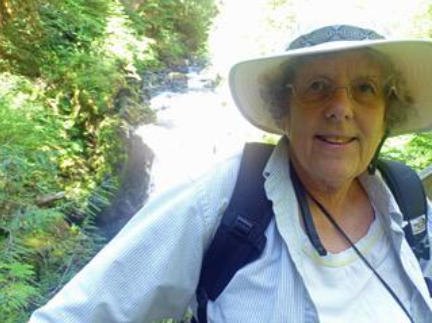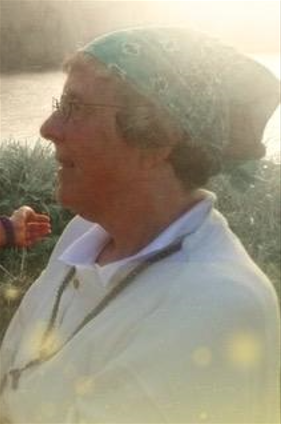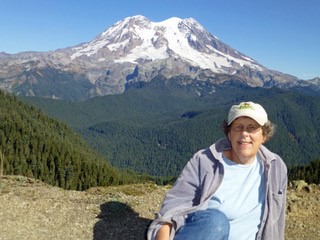This article is reprinted from The Echo, the newsletter of the South Sound Bird Alliance
Last month the natural world lost one of its strongest, most passionate and committed advocates. Sue Danver passed away after a long illness and the return of cancer.
Sue was a force for conservation all her life. From teaching environmental education in Maine, to interpreting the natural world to National Park visitors, to developing a river education program in Oregon. For the last twenty-five years Sue worked tirelessly with Audubon to protect the wildlife, open spaces, prairies, and the quality of life in Thurston County.
A Celebration of Life will be held midday on Sunday, September 7th. Please reserve this date and join us to celebrate her legacy and decades of work with our Audubon Chapter. Contact Bob Metzger at rmetzger7@aol.com for more information about this.
Sue’s environmental advocacy work in Thurston County spanned decades. She worked closely with many Audubon members in the Conservation Committee. Below are three perspectives from folks who worked with Sue at different times on various projects.
Deb Nickerson — I was on the Board when Sue moved to Olympia from Corvallis. She immediately joined Black Hills Audubon Society and specifically, the Conservation Committee, of which she served as chair for a number of years. At about the same time, I offered to organize the first Bird Feeder Cleaning Fundraiser behind Wild Birds Unlimited to raise some money for the chapter. Once or twice at the most, I thought. Sue also took on working to oppose the Quality Rock Mining proposal adjacent to the Black River in Tumwater. She expected it to take no more than 2 years of her time. Little did each know – I organized feeder cleanings twice a year for 10 years and Sue was the lead on Quality Rock for 20 years! Even after we won a court decision, the work on the mining proposals continued for several years.
Sue and I became fast friends through our volunteering with the chapter and our both being New Englanders through and through. Calls during the evenings lasted on average two hours. There was much to discuss as her daily life was consumed with attending meetings, writing testimony, conferring and writing with others and editors, visits to neighbors of affected areas in Thurston County, and figuring out how to pay for legal and biological services. The personal and professional mixed in the phone calls. Hikes along a river with Sue brought a sense of peace to her and to me alike. Memories and dreams shared and pondered. No matter how frustrated Sue could get, I always loved her sweet smile that lit up the room. Her laughter made you know that the heavy issues needed periods of levity.
When I became President of the chapter, I remember talking with Sue about needs for Conservation Committee issues and the ensuing work that needed to be done. Sue had already talked to a hydrologist and lawyers and secured their services; all I had to do was get the board to approve the funding. Many tens of thousands of dollars were spent over the years to fight gravel mines and asphalt plants, a Port transfer station on wetlands, protecting habitat of endangered species and advocating for inclusion of wildlife protections in Habitat Conservation Plans by the county. We funded the work after thoughtful, necessary discussion and our chapter lauded the success of her endeavors. Annual appeals and some special appeals for financial support brought in enough money to cover these costs. Our membership knew the quality of the work and supported it with their dollars. No matter what you might have thought of Sue’s personal style, we all respected her tenacity, her total commitment, and her doggedness in pursuit of solutions for wildlife and land protection. The rest of the Conservation Committee would look in awe at all she did in short periods of time. Many nights she stayed awake working until dawn.
Sam Merrill — When I ended my time as president of the chapter in 2013 and became chair of the Conservation Committee, Sue continued to be the most active member of the Committee. She frequently called me to keep me up-to-date on what she was doing and how and why, and what we should do next. Once Sue got ahold of an issue, she was a bulldog in gathering expert testimony, convincing officials, and pursuing the issue to completion. She was so persistent that we joked that the county officials and staff scattered when they saw her coming.
Way back in 2005, Sue signed a Settlement Agreement on behalf of BHAS concerning the Maytown property including the 810-acre West Rocky Prairie preserve now owned by WDFW and the 745-acre Rocky Prairie parcel now owned by the Port of Tacoma. According to the Agreement and Special Use Permit, following completion of gravel mining, the mine area would be reclaimed to trees, wetlands, lakes and transitional lands around these natural features.
As part of this Agreement, the Conservation Organizations involved were awarded funds (the Maytown Conservation Fund) for monitoring water levels and species of concern such as Oregon Spotted Frogs. This work has been managed throughout by BHAS under Sue’s leadership.
Sue worked on many issues in addition to gravel mining, including habitat connectivity across features like Interstate highways before it was on the radar for some of us. She worked for the preservation of wetlands in new housing developments and in the successful effort to protect the flora and fauna of rare prairie land by lobbying the Thurston Board of County Commissioners not to rezone as industrial the Rocky Prairie lands sought by the NorthPoint company.
Betsy Norton — I met Sue about 3 years ago. Like Deb, we’d have these loooong phone conversations – about conservation issues. Her response to “Are there salmon in this stream?” evolved into an hour-long story about the Black River Wildlife Refuge, her favorite agency person there, the worrisome mine next to it, the wonderful neighbor R- who lived next to the stream, his life story à la Sue, and the visit she made to his house that allowed Sue to verify there were indeed Coho in there. By the end of that conversation, this stream held a context so much richer than just a location that when I actually bumped into R- as I did with many FOS (Friends Of Sue) – it felt like meeting an old friend.
Sue always had a simmering list of issues waiting in the wings – loosely prioritized, because a phone call or an email alert could shoot something to the top of the list for action ASAP. When she got a phone call about helicopters flying low over critical habitat for the Olympia Pocket Gopher and the Streaked Horned Lark, we dropped everything and took off à la Nancy Drew to investigate. I guess you don’t normally think of ‘conservation emergencies,’ but Sue certainly saw it that way, and now I do too. That’s the effect Sue had on me.
Sue worked diligently over multiple years to lobby the Olympia Airport to protect listed species from airshow activities and unexamined development impacts in the Olympia Airport Master Plan – so that listed species, their habitat, and the surrounding environment are conserved for future generations. She helped get climate change analysis added to the Port’s SEPA process, pushed for Thurston County to conserve prairie habitat, worked long hours to save Beaver Creek — from industrial zoning — for Oregon Spotted Frogs, and lobbied hard to get Wildlife Corridors included in the Thurston County Comprehensive Plan.
In the last 3 years, Sue kept saying she wanted to retire, but it was just an intrinsic part of who she was. Indeed, at the meeting on the Airshow this March, she was there. I will miss her as a mentor and a friend, but I feel her spirit will be cheering us on, always.
~~~~~~~~~~~~~~~~~~~~~~~~~~~~~~~
We were honored to have Sue among us. The South Sound is better because of her tireless efforts and successes to make the powers that be take in to account the environment when decisions are made. There are few like her and we will miss her greatly. She was truly a gift to this world and I believe the world knew it.
In her home recovering from surgery this past Spring, Sue wrote to several of us which offered this glimpse of time spent during her day:
“My story is that I have a robin pair to which I feed chopped up apples. He flies to my front porch eave and stares at me maybe once today. Today he flew to a snag next to the dining room table/window. Since it is warm I talked to him (do that a lot) but this time I sang and whistled to him. Wow, he started singing back with a beautiful song.” – Sue
And when we hear the Robins sing, let us think of Sue and take the time to return their song. May we remember her in the birds of the prairie and forest, wind in the trees and lapping water on the shore.
Sue had this quote posted by her desk. It captures her philosophy and her work perfectly.
“Press On” Nothing in the world can take the place of persistence. Talent will not; nothing is more common than unsuccessful men with talent. Genius will not; unrewarded genius is almost a proverb. Education alone will not; the world is full of educated derelicts. Persistence and determination alone are omnipotent.
Editor’s Note: Black Hills Audubon Society (BHAS) was the chapter’s name during Sue Danver’s long association and policy work with us, and is thus referenced as such above. We are now named South Sound Bird Alliance (SSBA).



Wow..nice stories.memories.. I wonder if WIP whatever consider compiling some, I don’t even know what you would call them.. information about why Sue was so successful, and put it into a more formal article or how to, for the younger people that might want to do something similar to help save and make our environment stronger.